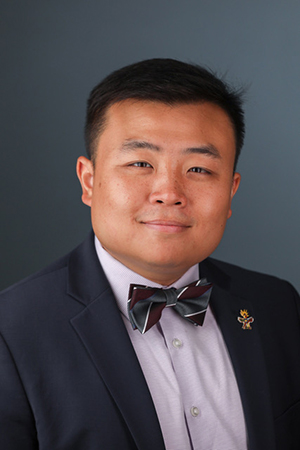Jack Zhang named inaugural recipient of KUIA Advisory Board International Teaching Award
LAWRENCE — Recognized for innovation in incorporating international education in the classroom, Jack Zhang, assistant professor of political science, is the inaugural recipient of the KU International Affairs Advisory Board International Teaching Award.
 Zhang will give a lecture on his work in international education during an award presentation and reception from 2:30 to 4 p.m. April 18 in the Kansas Union’s Big 12 Room.
Zhang will give a lecture on his work in international education during an award presentation and reception from 2:30 to 4 p.m. April 18 in the Kansas Union’s Big 12 Room.
The award honors KU faculty members who have provided outstanding and sustained leadership in international education through teaching, advocacy and mentorship. In particular, the selection committee was impressed with the international lens and experiential learning opportunities that Zhang has brought to his courses, along with his commitment to mentorship and research.
“In a short time, Jack Zhang has had a tremendous impact on the way we teach international material at KU, the way we bridge research and teaching, and the way we collaborate across disciplines when we do internationally engaged work,” wrote Melissa Birch, director of the Institute for International and Global Engagement, in a nomination letter.
Zhang, who earned his doctorate at the University of California San Diego, came to KU in 2019. An expert on U.S.-China relations and the role of business in international politics, Zhang is also the interim associate director of the Center for East Asian Studies. During his time at KU, he has taught introduction to international politics and foreign policy analysis and developed four Asia-related political science courses that are cross-listed with East Asian studies.
In his nomination letter, John James Kennedy, chair of the Department of Political Science, noted that Zhang teaches some of the most popular courses in the department.
Through grants and collaboration with faculty from other departments, Kennedy wrote that Zhang “has developed innovative ways to engage students in international relations and East Asian studies.”
Through grants from the centers for Teaching Excellence and East Asian Studies, Zhang has made international relations more relatable to students by building writing assignments around a U.S.-China trade war simulation or country risk analysis research project.
“Students seem to really engage in these opportunities to dive deeper into East Asia through role-playing, research and classroom activity,” wrote Akiko Takeyama, CEAS director and professor of women, gender & sexuality studies, in a nomination letter.
Zhang integrates teaching and research in his Trade War Lab, which seeks to understand the U.S.-China trade war and its effect on heartland communities through a bottom-up, data-driven, firm-centric approach. The lab allows undergraduate and graduate students to conduct collaborative research on policy-relevant topics by working in teams to map out global supply chains, survey business leaders, and collect data on tariff exclusions and congressional bills.
“Professor Zhang has created a unique experience for students teaching them to look beyond the headlines and how to evaluate the social and political implications of international policies,” Kennedy wrote.
Since its inception, the Trade War Lab has employed dozens of undergraduate students and five graduate students and is supported by more than $500,000 in internal and external grants. Ten of Zhang’s undergraduate research assistants have received Undergraduate Research Awards. Zhang has also co-written multiple papers with his graduate students.
Nominators also praised Zhang’s mentorship. Takeyama pointed to Zhang’s work with students from KU’s Emerging Scholars program, which supports low-income students’ transition into college by providing research opportunities in their first year. In 2023, Zhang received the Grant Goodman Undergraduate Mentor Award for his research mentorship.
He advises students in political science, global & international studies, economics and business who focus on East Asia in their theses or capstone projects.
“Many students in these disciplines are not necessarily trained to study East Asia or employ cross-cultural comparisons,” Takeyama wrote. “By working with Jack and receiving his advice, some students expand their geographic scope to include other parts of the world, namely East Asia.”
Zhang created the Trade War Lab speaker series, which has brought to KU more than 20 scholars from around the world in partnership with various campus co-sponsors such as IIGE, CEAS and the University Career Center. Along with the speaker series, Zhang has co-hosted the past three local China Town Hall events, which follow the national town halls organized by the National Committee on U.S.-China Relations. During his time at KU, Zhang has forged local partnerships with the International Relations Council, Dole Institute of Politics, World Trade Center of Kansas City and Kansas City Chamber of Commerce to promote global awareness.
International issues have also been a focus of Zhang’s research. He has published articles, book chapters and think tank reports on the U.S.-China Trade War. He is working on a book manuscript about the national security implications of economic interdependence with China.
Zhang’s scholarship has been recognized nationally. In 2023 he was one of 20 leading China specialists selected as a fellow for the Public Intellectuals Program through the National Committee on United States-China Relations. In 2021 Zhang was named a Wilson China Fellow through the Woodrow Wilson International Center for Scholars’ Asia Program, in conjunction with the Kissinger Institute on China and the United States. He has been interviewed by Bloomberg, CNBC, NPR, CGTN, Arirang TV, Strait Times and South China Morning Post as well as KU’s “When Experts Attack!” podcast.
“The combination of the timeliness of the research topic and the extent of Jack’s scholarly network has greatly enhanced KU’s visibility in the media and academia,” Birch wrote.
Financially supported by the KUIA Advisory Board, the international teaching award comes with a $1,000 stipend.